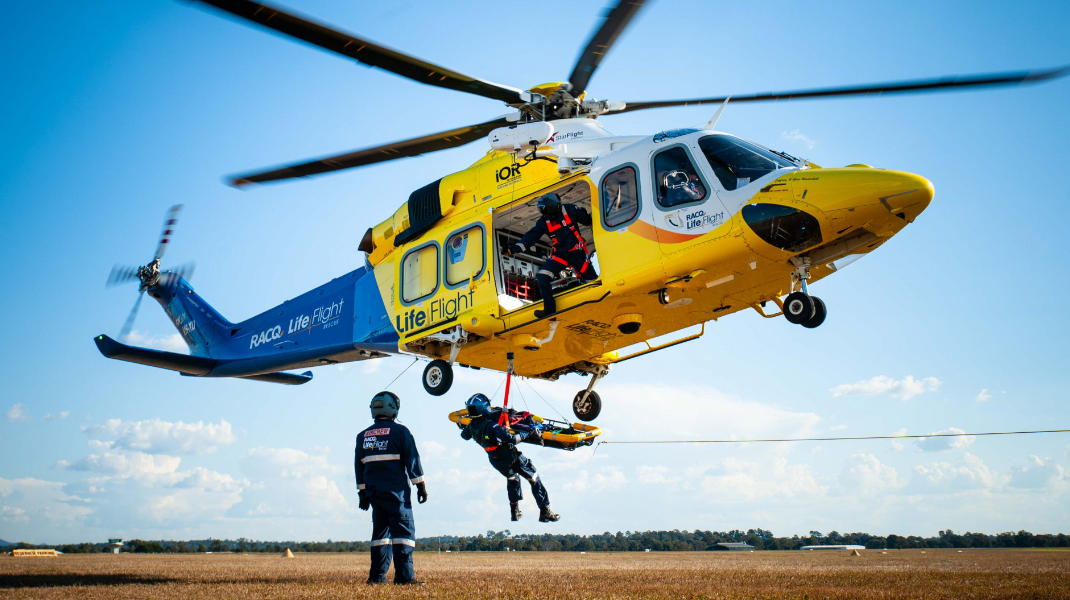
The diversity in our work is one of the things we enjoy most at Lokava. Every client and every project we undertake is vastly different, which means that whenever we begin a new mission, we gain the opportunity to absorb a lot of new knowledge around industries we might not otherwise have had an insight into previously. And naturally, working in such a hands-on manner with our clients, it’s impossible not to become invested in their goals.
Out of the many successful projects we’ve undertaken for clients, one of the many we’re very proud to have worked on is for LifeFlight Australia, a world leader in aeromedical care; that is, emergency services provided by helicopters or aeroplanes. For residents of Queensland, round the clock care is offered, regardless of where you live within the state. As a world leader in aeromedical care, LifeFlight’s round-the-clock effort in saving lives is nothing short of extraordinary.
For over four decades, the lives of Queensland residents have been saved thanks to LifeFlight’s bold response to emergencies. Being able to take to the air means response times are incredibly fast, and areas that may otherwise have been inaccessible can be reached. Staff training is comprehensive and intense, so any situation can be reacted to and adapted to on the fly. Dangerous situations are common, although for the experienced LifeFlight team, it’s all in a day’s work.
Lokava first came into contact with LifeFlight when they approached us in late 2018 with a special request. The nature of emergency medical services means that many staff end up working long hours, and burnout can come on quickly without careful staff management. LifeFlight needed us to develop them an app that would streamline this process: a comprehensive fatigue management system, built from the ground up.
Why is fatigue management important?
If staff fatigue isn’t handled well by senior management, burnout can occur. When people are stretched too far in their roles, working back-to-back shifts and losing out on sleep, there’s no limit to the potential negative effects. For the staff members themselves, this might mean a decline in physical health – sleep is restorative for our bodies – and serious harm to mental health, too. Without adequate rest, mental health problems such as anxiety and depression can spiral out of control. And that’s just the tip of the iceberg.
Staff who are overexerted and running on fumes can mean a potentially severe impact of the wellbeing of emergency patients. This might stem from complications due to slowed response times, missed details, or the inability to provide adequate care. In short, when people’s lives are hanging in the balance, having an exhausted, burned-out team in charge of those lives can be strongly detrimental. Therefore, the app LifeFlight had called on Lokava to build was of utmost importance – and we couldn’t wait to get involved and help in making a positive difference.
How did we approach the problem?
After many in-depth talks with the team at LifeFlight, our proposed solution was to create a custom-made app for the company’s medical team to use via their mobile phones. Reporting in the app would be handled by a web-based system. The app would work by using data on staff member’s sleep, input by users. This information would then be used to perform a calculation on how fatigue would likely progress and impact the individual over the course of the next 24 hours.
This would mean that management within LifeFlight would have a clear view of which employees were likely to be more tired on any given day, and could plan shift patterns and staffing accordingly. The reporting functionality through the web-based backend of the app would be able to accurately interpret the user information entered, and could be thereby exported for closer analysis.
A key aspect of the app was its design: it had to be simple and clear. This was crucial for two reasons: to avoid taking up time from any given staff member’s day, and to prevent the incorrect entry of data – which of course, may have led to serious repercussions further down the line. In addition, to make the login process smooth and easy, we proposed using Microsoft Azure AD sign in, which would allow doctors and other staff members to log in to the app using their company email address and password, to keep things simple and streamlined.
The outcome
We first built a smaller-scale version of the app as a prototype, and when running early tests, we experienced very promising results. We took into account feedback from our early test group and added minor updates to the code as and when required. Several months later, the LifeFlight Fatigue Tracker app was finally ready to be rolled out to the rest of the organisation's staff.
Since we first deployed the app and instructed the LifeFlight team how to use it effectively, it has become an integral part of the day to day business. Today, it helps keep medical staff operating all over Queensland to stay sharp, healthy, and happy – both on the job, and at home. In turn, this means that the patients treated by LifeFlight have access to the best care possible. If you're interested in learning more about the software specifically, you can refer to our case study here.
An important addition during the pandemic
Since the beginning of 2020, doctors and medical staff have been run off their feet, all around the world. Reliance on emergency medical services has shot up in many countries and organisations like LifeFlight have been working hard to keep up. With apps like the one we’ve developed for LifeFlight, it is increasingly possible for lives to continue to be saved, and for optimum care to be provided, time and time again.
There will always be a need for innovative emergency care for organisations such as LifeFlight. Now, with effective fatigue management technology available to their entire workforce, they’re able to leave burnout in the past, and focus on saving lives.
Subscribe Now
Sign up to receive content straight to your inbox.
More articles you might like to read
-

10 ways to ensure your team stays unmotivated in the new year
Read Full Story -

Why has cybercrime thrived during the pandemic?
Read Full Story